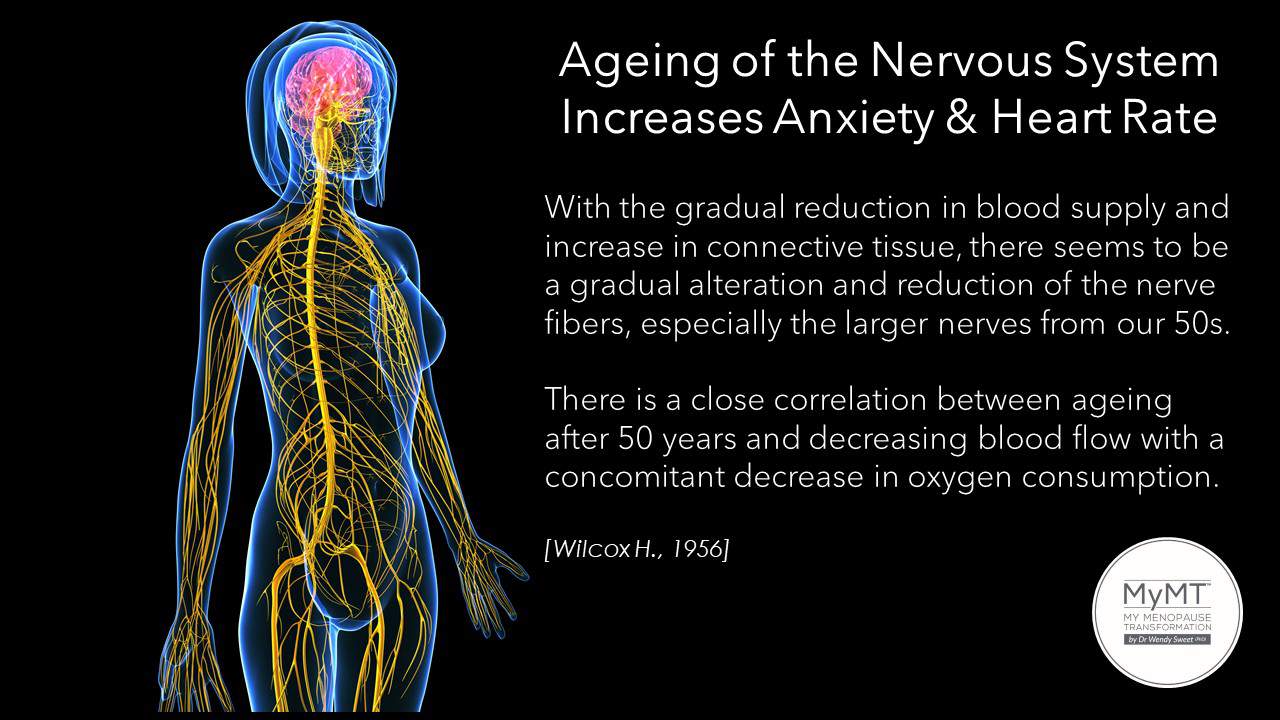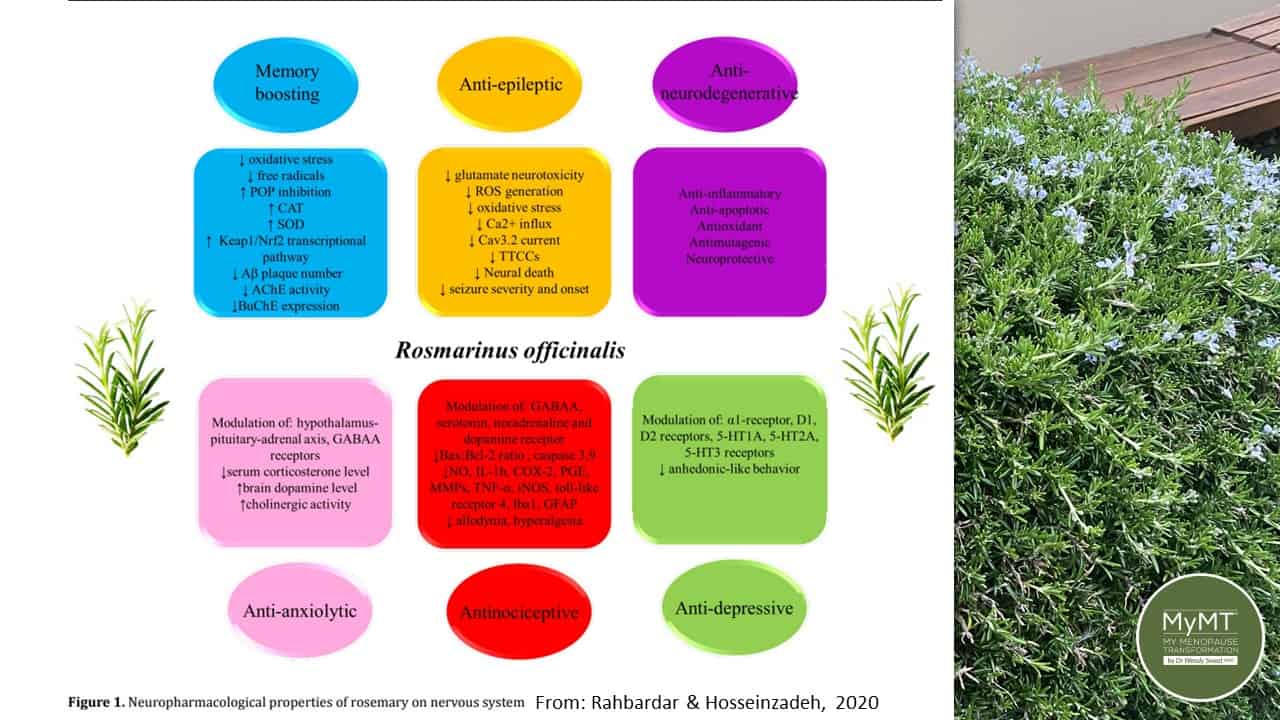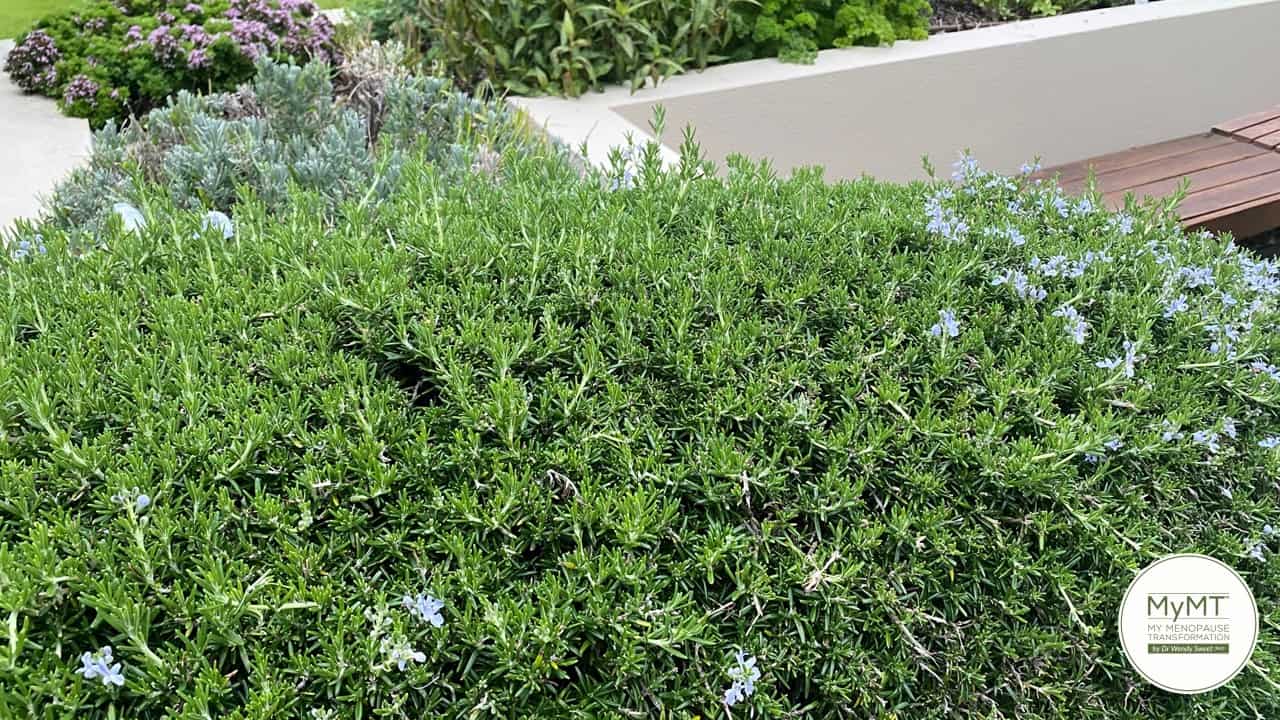This evergreen bushy shrub which grows along the Mediterranean Sea, in sub-Himalayan areas and fortunately, in my herb garden, wasn’t mentioned by my Pharmacist when I enquired about menopause supplements for anxiety. I wish it had been. Because a few weeks later, the supplements that I did buy at the time, weren’t making any difference. I still felt as if my breathing was more rapid, my heart rate was elevated and the palpitations hung around as well as the feelings of agitation and irritation.
The shrub I’m talking about is Rosemary. The photo above was taken in my garden. I wish that I knew back then, what I know now about the importance of rosemary, not only as an anti-anxietal but also as an anti-inflammatory.
We all know that herbal medicines and natural products have been used in ancient therapies, and whilst I’m not a Naturopath or a Pharmacist, the interest in pharmaceutical herbs that help with menopause has been increasing over the past decade. I hope that Rosemary is on the radar of Pharmaceutical and Supplement companies, interested in this age and stage of life. If it’s not, it should be.
And if you are feeling anxious and not on top of your nervous agitation, then perhaps you can plant some rosemary in your herb garden too? Not only does it have anti-anxiety properties, but the intense fragrance has a wonderful calming effect as well.
Menopause anxiety is enormously concerning as well as distracting us from our day to day lives. However, this is all to do with how our nervous system is changing as we age. When we understand that the decline in oestrogen is all part of our ageing and our nervous system is affected by this stage of life, then we explore the addition of powerful herbs and foods that complement whatever other strategies or interventions we might also be implementing.
Female sex hormones have a strong neuro (nerve)-protective role and reduction of oestrogens during our menopausal transition is associated with multiple neuro-physiological changes. This includes inflammatiory changes on the outer nerve sheath called the myelin sheath, and a decline in the rate of conduction of the nerve impulse between nerves as well as from the nerve ending to muscles.

The importance of spices and herbs in the Mediterranean diet can’t be over-stated. Many women living long lives in the Blue Zones regions, which includes Okinawan Island women, don’t have lots of supplements typically seen in western pharmacies – their gardens are their supplement saviours according to Blue Zones researcher, Dan Buettner.
When I learnt this myself as well as the powerful role that Rosemary has as an anti-anxietal herb, I began to love my herb garden just a little bit more. The leaves of many herbs can be added to cooking, such as rosemary. I tell you about it in the video below.
Rosemary has potent compounds and has been used in traditional medicine to alleviate headaches, dysmenorrhea (painful periods), depression, hysteria, mental agitation, rheumatic pain, depression, anxiety and physical and mental fatigue. (Rahbardar & Hosseinzadeh, 2020). It’s also a known anti-inflammatory.

We all know that chronic stress is a manifestation of our busy lives, and emotional disorders that arrive in menopause, such as increased anxiety, place an additional burden on us. But as oestrogen declines with our ageing, as well as the effects of our stressful lives, this becomes a ‘perfect-storm’ for more rapid changes to our nervous system from neuronal inflammation.
Understanding that menopause is a vulnerable time for our psychological and physical wellbeing is important. As such, we need to make some changes to our lifestyle in order for our hormones to re-adjust to a ‘new normal’. Adding herbs such as rosemary to our diet is just one small aspect of something that we can do to help ourselves and I explain why in the short video below.
Nervous system disorders such as increased anxiety are a hallmark of menopause and numerous women, myself included, don’t understand why. As I went down the rabbit-hole of every one of my symptoms in menopause when various supplements no longer worked, I realised that I wasn’t following the evidence on the Mediterranean diet which is suited to improving women’s health as they age.
Dr Wendy Sweet (PhD)/ MyMT™ Founder & Member: Australasian Society of Lifestyle Medicine
References:
Ghasemzadeh Rahbardar M, Hosseinzadeh H. (2020). Therapeutic effects of rosemary (Rosmarinus officinalis L.) and its active constituents on nervous system disorders. Iran J Basic Med Sci. 23(9):1100-1112. doi: 10.22038/ijbms.2020.45269.10541.
Preedy V. & Watson, R. (2020). The Mediterranean Diet: An evidenced-based approach. 2nd Edition, Elselvier Academic Press: London, England.

